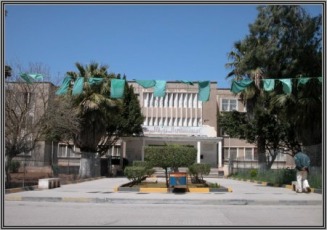Libya: HIV/AIDS
Disease Devastates a Nation
By: Anna Maria Katsoyannis

AIDS is a growing problem in Libya. Although the health care is not up to the standards it needs to be, health care continues to strengthen, helping the issue and people. Awareness and treatment of AIDS in Libya is extremely important. It is hard to have control of such a country while there is a horrible disease affecting its people.
Like most African countries, Libya’s HIV/AIDS problem originated from poor healthcare and un-cleanliness. In 1998, with the help of five Bulgarian nurses, a Palestinian doctor initially infecting 426 children with HIV/AIDS. These six individuals got arrested and sentenced to death until a surprising release in 2006 (Medical News Today, 1). This story caused a great controversy in Libya. Libya cannot handle all these cases of HIV/AIDS at once, children are sent to Europe for healthcare. Libyan doctors are being sent to Europe to learn how to treat the disease. Yet, Libya’s HIV/AIDS problem is still ongoing (Rosenthal, 2). Because these children were affected at a young age, the ones who have not died yet will most likely pass HIV/AIDS on to future generations, which will essentially cause a major problem (Rosenthal, 3). This trial negatively affected the HIV/AIDS epidemic in a big way (Medical News, 1). New precautions are being taken to prevent another crisis like this.
Libya’s HIV/AIDS epidemic has been growing at a dramatic rate (Libya’s AIDS and Healthcare Stats, 1). HIV/AIDS has become a huge problem in this society. Death rate is rising, more people are being affected, and new precautions have been put forth. As of data in 2004, ninety percent of the 5,160 infections in Libya have been from 2000-2002 (Libya’s AIDS and Healthcare Stats, 1). It has been proven that Libya's problem comes from its geographic location, its foreign policy and its domestic healthcare policy. The reason there are so many outbreaks of HIV/AIDS in Africa, is because of those three things as well (Libya’s AIDS and Healthcare Stats, 1). Geographic location should not be the determiner for healthcare. In fact, not only are Libyans seeking treatment to Europe, but also to places like Jordan and Tunisia. Those countries are poorer than Libya but still have better healthcare (Libya’s AIDS and Healthcare Stats, 2). This is a huge problem. It seems that even with the boosts in Libya’s healthcare, only few improvements have shown because of its geographic location.
HIV/AIDS is a global health scare. Countries alike Libya, have been targeted. It is apparent that we need to address this problem. Although the countries current status to this problem has improved, it is still not close to being resolved. This epidemic is making it hard to colonize and control Libya. It has impacted and affected so many people around the area. It is safe to say that HIV/AIDS is one of Libya’s most urgent complications.
Like most African countries, Libya’s HIV/AIDS problem originated from poor healthcare and un-cleanliness. In 1998, with the help of five Bulgarian nurses, a Palestinian doctor initially infecting 426 children with HIV/AIDS. These six individuals got arrested and sentenced to death until a surprising release in 2006 (Medical News Today, 1). This story caused a great controversy in Libya. Libya cannot handle all these cases of HIV/AIDS at once, children are sent to Europe for healthcare. Libyan doctors are being sent to Europe to learn how to treat the disease. Yet, Libya’s HIV/AIDS problem is still ongoing (Rosenthal, 2). Because these children were affected at a young age, the ones who have not died yet will most likely pass HIV/AIDS on to future generations, which will essentially cause a major problem (Rosenthal, 3). This trial negatively affected the HIV/AIDS epidemic in a big way (Medical News, 1). New precautions are being taken to prevent another crisis like this.
Libya’s HIV/AIDS epidemic has been growing at a dramatic rate (Libya’s AIDS and Healthcare Stats, 1). HIV/AIDS has become a huge problem in this society. Death rate is rising, more people are being affected, and new precautions have been put forth. As of data in 2004, ninety percent of the 5,160 infections in Libya have been from 2000-2002 (Libya’s AIDS and Healthcare Stats, 1). It has been proven that Libya's problem comes from its geographic location, its foreign policy and its domestic healthcare policy. The reason there are so many outbreaks of HIV/AIDS in Africa, is because of those three things as well (Libya’s AIDS and Healthcare Stats, 1). Geographic location should not be the determiner for healthcare. In fact, not only are Libyans seeking treatment to Europe, but also to places like Jordan and Tunisia. Those countries are poorer than Libya but still have better healthcare (Libya’s AIDS and Healthcare Stats, 2). This is a huge problem. It seems that even with the boosts in Libya’s healthcare, only few improvements have shown because of its geographic location.
HIV/AIDS is a global health scare. Countries alike Libya, have been targeted. It is apparent that we need to address this problem. Although the countries current status to this problem has improved, it is still not close to being resolved. This epidemic is making it hard to colonize and control Libya. It has impacted and affected so many people around the area. It is safe to say that HIV/AIDS is one of Libya’s most urgent complications.
Bibliography
"ALARM: Libya's AIDS and Healthcare Stats." Geocites. 30 Dec. 2004. <http://www.geocities.com/libylet/health.htm>.
This source was extremely helpful. It gave me an enormous amount of information. Mainly on how Libya is currently trying to fix the problem. It also told me who is affected and what is being done to prevent the disease from being spread a lot more.
"Medical Workers' Release Brings Attention To HIV/AIDS Epidemic In Libya, New York Times Reports."Medical News Today. 2 Aug. 2007. <http://www.medicalnewstoday.com/articles/78386.php>.
This article clarified the trial for me. It didn't give me a lot of information though. The article wasn't long enough for a lot of detail, but it was important research I needed to learn.
Rosenthal, Elisabeth. "Libya Sends Children With AIDS to Hospitals in Europe." The New York Times 26 Oct. 2006.
This was my most helpful source. It sparked my paper. Without this article I would have not found my other sources. I learned all about the trial, controversy, and how HIV/AIDS is affecting Libyans.
This source was extremely helpful. It gave me an enormous amount of information. Mainly on how Libya is currently trying to fix the problem. It also told me who is affected and what is being done to prevent the disease from being spread a lot more.
"Medical Workers' Release Brings Attention To HIV/AIDS Epidemic In Libya, New York Times Reports."Medical News Today. 2 Aug. 2007. <http://www.medicalnewstoday.com/articles/78386.php>.
This article clarified the trial for me. It didn't give me a lot of information though. The article wasn't long enough for a lot of detail, but it was important research I needed to learn.
Rosenthal, Elisabeth. "Libya Sends Children With AIDS to Hospitals in Europe." The New York Times 26 Oct. 2006.
This was my most helpful source. It sparked my paper. Without this article I would have not found my other sources. I learned all about the trial, controversy, and how HIV/AIDS is affecting Libyans.
Last updated by Anna Maria Katsoyannis on May 26, 2009

